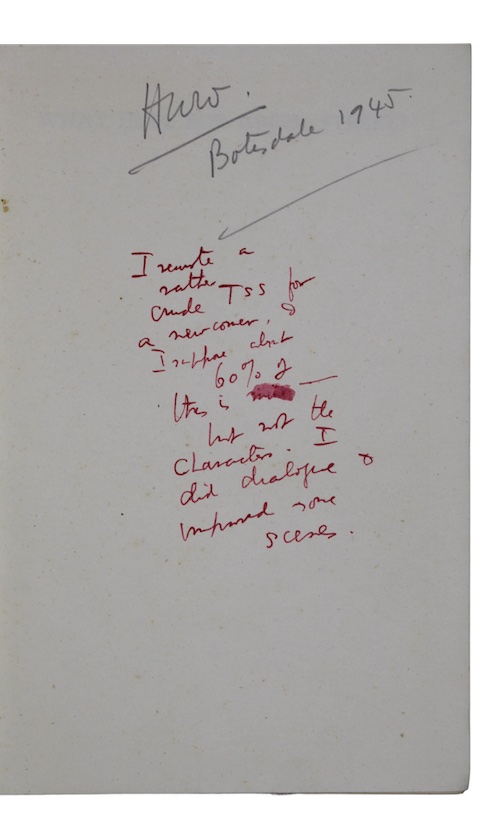REWRITTEN BY WILLIAMSON
What hope for green st?.
London.
Jarrolds Publishers Limited, [1945].
First edition.
8vo.
128pp. Original publisher's black cloth boards lettered in gilt, with the unclipped green dustwrapper. Minor shelf-wear, chipping to edges, losses to spine with some further marks. A note on the front free endpaper in Williamson’s hand: 'I rewrote a rather crude TSS for a newcomer, & I suppose about 60% of this is mine - but not the characters. I did dialogue & improved some scenes.'
Henry Williamson's copy of British novelist and fascist Olive Hawks's (1917- 1992) debut novel written during her internment in Holloway prison, which he heavily edited for publication. An inserted printed email to Anne William notes a transcription of a letter, dated August 1945, from Williamson to friend and eventual unofficial biographer Lois Lamplugh: 'I rewrote a book for someone recently, it comes out soon with Jarrolds, called 'What Hope for Green Street?' After that, the first-author (whose work was jejune and only partly readable) must dree her own weird. I'll give no more advice.')
Both Hawks and Williamson were members of the BUF, and grew up in South East London, though no correspondence between them or accounts of their ever meeting are in evidence. However, some literary relationship must have existed for the dust wrapper of Hawks's fourth novel to state she was 'discovered and launched by Henry Williamson'. Hawks also previously dedicated her second novel Time is my Debtor (London, 1947), 'Gratefully' to Henry Williamson. Olive Hawks joined the British Union of Fascists in 1933 and was a frequent contributor to various BUF publications including The Fascist Week, Action, and The Blackshirt. Hawks became less vocal with her fascist views after spending four years interned at Holloway Prison as a Nazi sympathiser.
Henry Williamson (1895-1977), novelist and writer on natural history and the English countryside, is predominantly remembered as the author of Tarka the Otter (1927) for which he won the Hawthornden Prize. His wartime experiences on the Western Front having altered his life inexorably, he spent the remainder of his post-war life in Devon, Norfolk and Suffolk, writing naturalistic novels very much in the romantic tradition.
£ 750.00
Antiquates Ref: 27240
Both Hawks and Williamson were members of the BUF, and grew up in South East London, though no correspondence between them or accounts of their ever meeting are in evidence. However, some literary relationship must have existed for the dust wrapper of Hawks's fourth novel to state she was 'discovered and launched by Henry Williamson'. Hawks also previously dedicated her second novel Time is my Debtor (London, 1947), 'Gratefully' to Henry Williamson. Olive Hawks joined the British Union of Fascists in 1933 and was a frequent contributor to various BUF publications including The Fascist Week, Action, and The Blackshirt. Hawks became less vocal with her fascist views after spending four years interned at Holloway Prison as a Nazi sympathiser.
Henry Williamson (1895-1977), novelist and writer on natural history and the English countryside, is predominantly remembered as the author of Tarka the Otter (1927) for which he won the Hawthornden Prize. His wartime experiences on the Western Front having altered his life inexorably, he spent the remainder of his post-war life in Devon, Norfolk and Suffolk, writing naturalistic novels very much in the romantic tradition.




